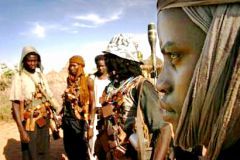Darfur rebels fears may hamper peace agreement
April 28, 2006 (ABUJA) — The Sudanese government said it was ready to sign a deal brokered by the African Union (AU) to bring speedy peace to Sudan despite reservations over some of its contents.
 Meanwhile reservations also expressed by the Sudanese rebel movements at peace talks here may hamper the deal brokered by the international community even as the deadline set by the AU nears, observers warned.
Meanwhile reservations also expressed by the Sudanese rebel movements at peace talks here may hamper the deal brokered by the international community even as the deadline set by the AU nears, observers warned.
“The top priority for the government of Sudan is peace and stability,” a spokesman for the Khartoum delegation, Abdulahman Zuma, told reporters here.
“We also want the AU to claim victory over this crisis. We do not want to let the AU down and that is why we have given a lot of concessions in all aspects of this peace process.”
“We appeal to all parties to exert the utmost degree of concession and to show that we are capable of resolving the reservations we have about the AU document,” said Zuma.
“The government is prepared to sign the (AU) document even with our reservations. Our reservations are important but they are not as important as to spoil the peace process,” he added.
Ahmed Hussain, a spokesman of the rebel Justice and Equality Movement (JEM) told reporters his side wanted full guarantees from the international community.
“Before we sign the agreement, we need a clear guarantee from the African Union and the international community that the contents of the peace pact will be respected by all the parties to the conflict,” he said.
“This is our major reservation about the agreement. We want to be sure of the implementation and the mechanisms for it. The movements believe that when dealing with the government in Khartoum we need all the assurance that we can get. But the AU does not seem to understand our point of view,” the JEM official continued, adding: “We want these our reservations to be inserted in the AU peace document before we sign it.”
The rebel movements are also insisting on having the Arabic translation of the AU document to ensure that the contents are similar “legally and administratively” to those of the English version, Hussain said.
But AU spokesman Noureddine Mezni said that while the AU was ready to explain “grey areas” in the document to any of the parties, it was not disposed to change the peace document, which, he said, was drafted in conjunction with the international partners, including the League of Arab States.
The presence of the UN Secretary General’s special representative for the Sudan, Jan Pronk, and the AU chairman’s special representative on Darfur, Baba Gana Kingibe, was expected to give a fillip to efforts to make the parties sign the peace deal ahead of the deadline.
The Darfur crisis has claimed more than 300,000 lives, while around two million others have been displaced since the trouble broke out three years ago.
The UN human rights high commissioner, Louise Arbour, went to Sudan Saturday amid growing calls for the government to end rights abuses, particularly in its suppression of the Darfur uprising.
UN officials would confirm only that Arbour was due to meet senior government officials and rights activists and visit Darfur and south Sudan.
The visit comes amid concern that the grave humanitarian crisis in the western province has only worsened.
Since her visit in 2004, Arbour has issued two major reports on the situation in Sudan, one focusing on sexual violence and the other on the general human rights situation.
Arbour has been highly critical of the Sudanese government, accusing it of continuing to support Arab militias known as Janjaweed, blamed for abuses in Darfur.
US President George W. Bush on Friday pressed Khartoum to bring peace to war-torn Darfur, which his government has termed a case of genocide.
“The message to the Sudanese government is: We’re very serious about getting this problem solved. We don’t like it when we see women raped and brutalized,” the president said at a White House press conference.
(ST)
